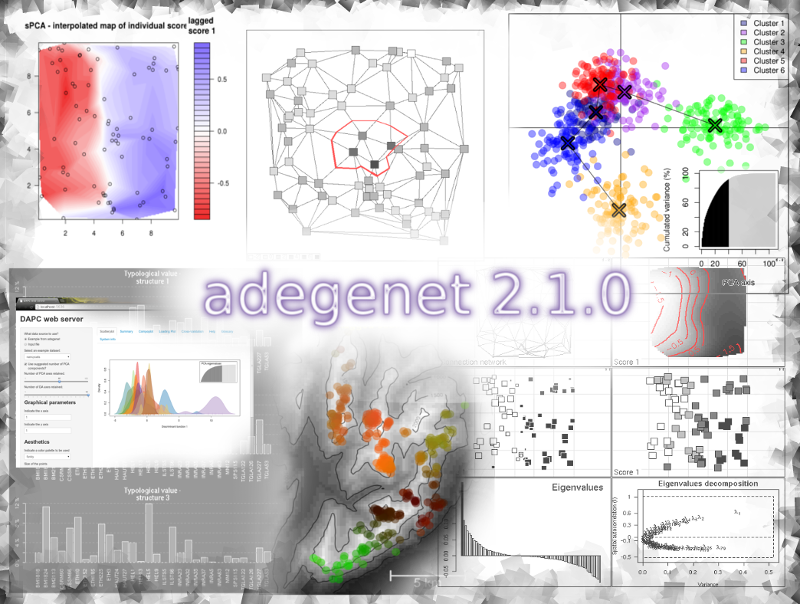
NOTE:
this website will soon be replaced by a new github page.
Meanwhile, up-to-date information on adegenet can be found on
github:
https://github.com/thibautjombart/adegenet/wiki
adegenet is an package dedicated
to the exploratory analysis of genetic data. It implements a set
of tools ranging from multivariate methods to spatial genetics
and genome-wise SNP data analysis.
package dedicated
to the exploratory analysis of genetic data. It implements a set
of tools ranging from multivariate methods to spatial genetics
and genome-wise SNP data analysis.
It is developed on Github by Thibaut Jombart, Zhian N Kamvar, Caitlin Collins, Roman Lustrik, Marie-Pauline Beugin, Brian Knaus, Peter Solymos, Vladimir Mikryukov, Klaus Schliep, Ismail Ahmed, Anne Cori, Tobias Erik Reiners, Federico Calboli and Péter Sólymos, and officially released on CRAN periodically.
adegenet is described in the following publications:

The main features of adegenet are:
Maintainer: Thibaut Jombart (website)
Suggestions, comments and contributions are most welcome!
https://github.com/thibautjombart/adegenet/wiki
adegenet is an
 package dedicated
to the exploratory analysis of genetic data. It implements a set
of tools ranging from multivariate methods to spatial genetics
and genome-wise SNP data analysis.
package dedicated
to the exploratory analysis of genetic data. It implements a set
of tools ranging from multivariate methods to spatial genetics
and genome-wise SNP data analysis. It is developed on Github by Thibaut Jombart, Zhian N Kamvar, Caitlin Collins, Roman Lustrik, Marie-Pauline Beugin, Brian Knaus, Peter Solymos, Vladimir Mikryukov, Klaus Schliep, Ismail Ahmed, Anne Cori, Tobias Erik Reiners, Federico Calboli and Péter Sólymos, and officially released on CRAN periodically.
adegenet is described in the following publications:
- Jombart T. (2008) adegenet: a R package for the
multivariate analysis of genetic markers. Bioinformatics 24: 1403-1405. doi:
10.1093/bioinformatics/btn129 [link
to a free pdf]
- Jombart T. and Ahmed I. (2011) adegenet 1.3-1: new tools for the analysis
of genome-wide SNP data. Bioinformatics.
doi: 10.1093/bioinformatics/btr521 [link
to
the bublisher's website]

sPCA, DAPC and its
web application, typological coherence of markers,
Monmonier algorithm, ...
The main features of adegenet are:
- data representation (classes) suitable for multivariate analysis
- data import from GENETIX, STRUCTURE, Genepop, Fstat, Easypop, or any dataframe of genotypes
- data import from aligned DNA sequences to SNPs
- data import from aligned protein sequences to polymorphic sites
- data export to the R packages genetics, hierfstat, LDheatmap
- handling of different
levels of ploidy
- handling of codominant markers and presence/absence data
- basic and advanced data manipulation
- basic data information (heterozygosity, numbers of alleles, sample sizes, ...)
- computation of genetic distances
- simulation of hybridization
- methods for spatial genetics: sPCA, tests for global and local structuring, Monmonier algorithm
- the seqTrack algorithm for reconstructing genealogies of haplotypes
- simulation of genealogies of haplotypes
- Discriminant Analysis of Principal Components (DAPC)
- efficient genome-wise SNP data handling and analysis
- extraction of SNPs from genomic alignments
- graph-based clustering of genomic data
- identification of mutations between pairs of sequences
- visualization of SNPs density and test for the randomness of their distribution
- web interface for DAPC, including feature selection and cross validation
- fast maximum-likelihood clustering and identification of hybrids using snapclust
- export multivariate analysis results for geographic mapping using mvmapper
- and more...
Maintainer: Thibaut Jombart (website)
Suggestions, comments and contributions are most welcome!